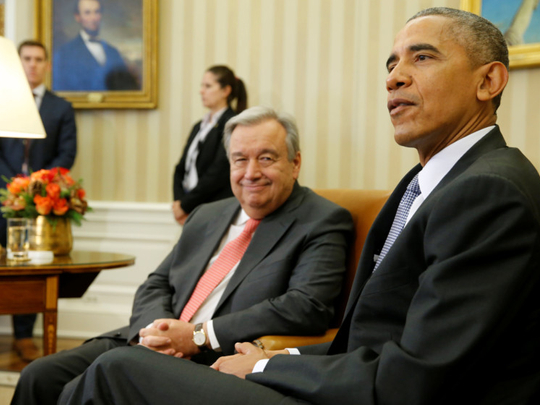
It is less than seven weeks before the United States President Barack Obama officially hands over the presidency to President-elect Donald Trump on January 20. Many politicians and observers, including former US president Jimmy Carter are anxiously waiting to see whether Obama would surprise the world before he departs the White House, by recognising Palestine to take its rightful place as a full member of the United Nations.
Simply, Dawlat Filastin (the state of Palestine) as it is known in Arabic, is already a full member-state of many other regional and international organisations all over the world, including the European Union (EU). Nine out of 28 EU member-states have already recognised Palestine as a state, while the latter enjoys Representative Status with the rest. Palestine is also a de jure sovereign state in the region as recognised by at least 137 UN members. It has an observer-state status in the UN since 2012. This implicitly amounts to a de facto recognition of Palestinian statehood in the entire West Bank and Gaza Strip (with occupied East Jerusalem as the designated capital), illegally occupied by Israel since the aftermath of the Six-Day War in 1967.
Writing in the New York Times last Monday (it was published in Gulf News last Wednesday), Carter joined tens of hopefuls lobbying Obama to make a dramatic move on the Middle East before departing White House, by declaring America’s recognition of Palestine as an independent state. “I am convinced”, Carter wrote, “that the US can still shape the future of the Israeli-Palestinian conflict before a change in presidents.” Carter had helped, in 1978, broker the Egyptian-Israeli ‘Camp David’ peace deal, and had also helped in 2006 to legitimise the use of the term ‘apartheid’ to describe Israel’s occupation of Occupied Territories.
However, unfortunately, as Carter wrote, “time is running short” unless Obama takes the necessary step before his term expires, to grant American recognition to the state of Palestine. For the UN Security Council to be practically able to clear the way for a resolution on the future of this half-a-century-long conflict, such a recognition from US is vitally important.
Any UN resolution, as the Palestine National Authority President Mahmoud Abbas had declared in his address at the Fatah 7th General Congress in Ramallah, must recognise Palestine as a full member-state, as well as reaffirm the illegality of all Israeli colonies beyond the 1967 borders.
So far, calls by both Carter and the Palestinians have been ignored by Israeli officials. But it seems — as highly-placed European sources in London recently spoke about this to this writer — there is currently a great deal of quiet discussion across the Atlantic, involving Russia and China, over the issue. This makes the possibility of a change of heart over Palestine in the White House before Obama’s departure, more likely than not. Apparently, quite af ew prominent think-tanks and European officials have been talking to officials in the US State Department and the White House to act in tandem and take some action on the Palestine conflict before the president-elect takes the presidency.
Last October, the New York Times had highlighted this point when it urged Obama not to waste any more time and quickly back a UN Security Council resolution, laying down guidelines for a peace agreement. Few suggestions in this regard have been floating around, including, at the very least, backing or abstaining on an anti-colony resolution, if the Obama administration finds it difficult to back a resolution recognising Palestine.
Israel’s continuous policy is maintaining the rejectionist position of any UN involvement in the Palestinian issue and leaves the final solution of the conflict to direct negotiation. This format of negotiation would guarantee Israel the upper hand in any future settlement, if any.
European officials point to the “highly combustible risks” of non-action over the issue under the existing circumstances and in view of the uncontrollably dangerous upheaval in the region since 2011. It is widely believed that Israel’s blind and continuous rejection of Palestinian rights will increasingly inflame the region and possibly put Israel’s future on the line.
However, it is not clear yet what direction the outgoing Obama administration will take. So far, there is no obvious indication from the Israeli side of any plan that Obama might be plotting, but it seems that there is some degree of suspicion among officials that he may do something in the waning days of his administration. Israeli Prime Minister Benjamin Netanyahu has expressed hope that Obama will not disappoint Israel on the issue. In an address last Sunday, he said: “I expect that in the twilight of President Obama’s tenure, he will stand by what he said in 2011, that the way to achieve peace (with the Palestinians) does not run through Security Council resolutions, but rather direct negotiations.”
Therefore, action is urgently required, particularly after the result of the American presidential election. As an unknown quantity and a non-politician with no knowledge of world affairs — who will soon be taking over the White House — Trump can easily be persuaded to keep the Palestinian conflict on hold. The president-elect has clearly set out his overall international strategy by hinting that his administration’s plan will be to pull the US out of the world’s conflicts. As things currently stand, there is an opportunity available for Obama to play his last card on the Middle East. Can he? Will he?
Mustapha Karkouti is a former president of the Foreign Press Association, London. You can follow him on Twitter at www.twitter.com/@mustaphatashe.










